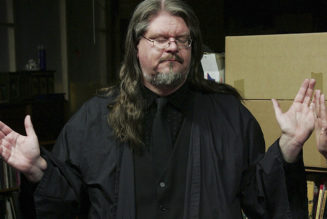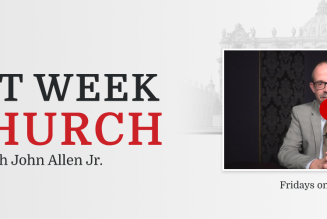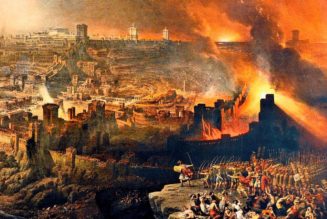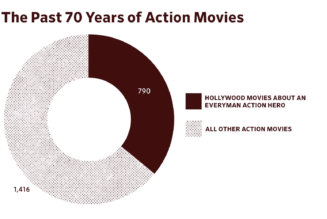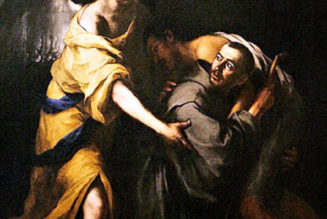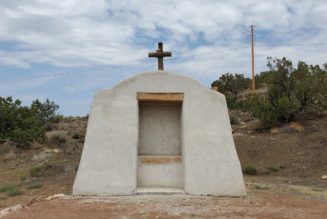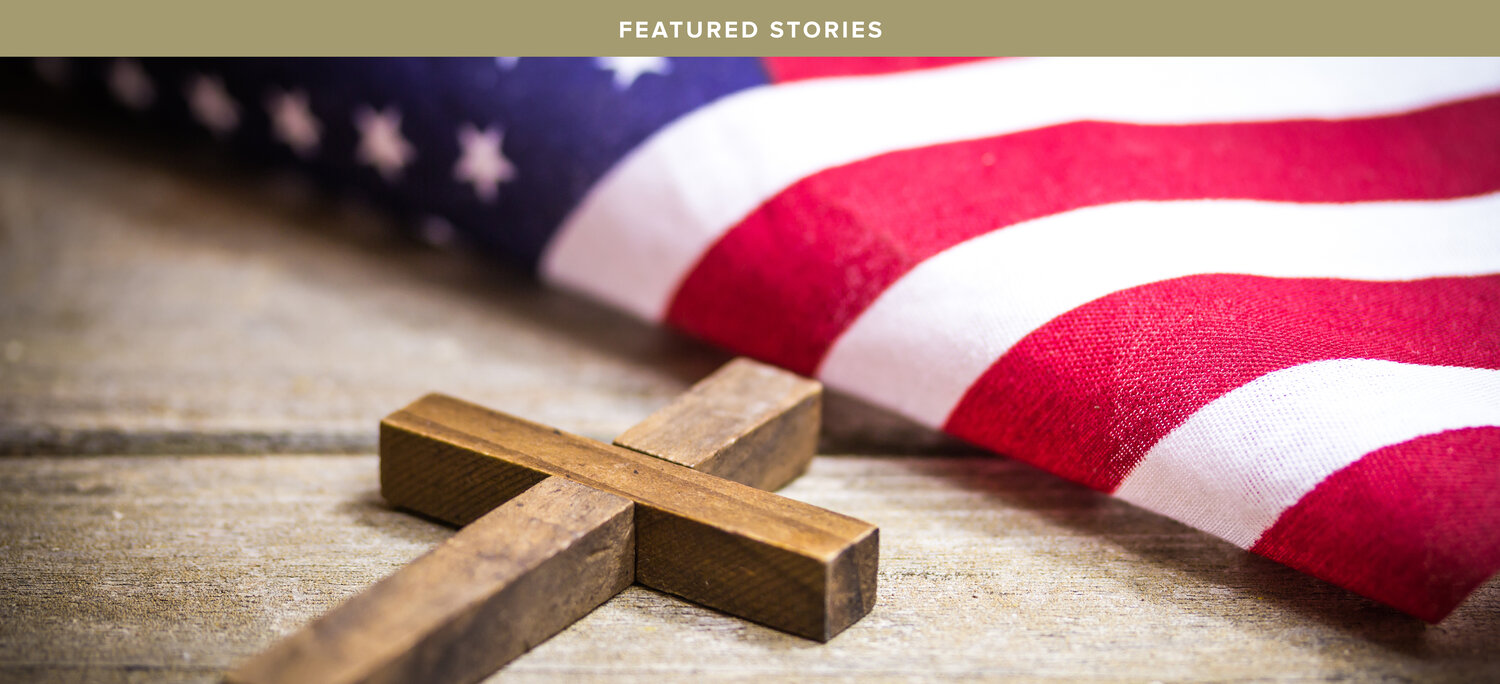
In 1899, Pope Leo XIII issued an apostolic letter, Testem benevolentiae, in which he expressed concern regarding the development of “those views which, in their collective sense, are called by some ‘Americanism.’”[1] The issue was complicated, but at its root was Leo’s concern that certain American cultural norms—in particular the Protestant privileging of the authority of private judgment and of equality over hierarchy—were infiltrating and corrupting the Church in America. The recent celebration of Independence Day gave occasion to reflect on this issue. Over Fourth of July weekend, I experienced two very different patriotic sermons: one that nearly presented the Founding Fathers as crypto-Catholics, the other that reminded us that while love of country is a virtue, Catholic patriotism must be tempered by the acknowledgment that America was founded on the Enlightenment principle of autonomous reason. Historically, the second view is undeniably the accurate one: “Nature’s God” is not the Triune God of Christianity. This should not trouble us. The Church has a long history of Christianizing pagan political structures; think no further than the Roman Empire and Germanic feudalism. Our unique challenge today is the inability of many American Catholics to see that our political structures and traditions need Catholicizing—either due to a misguided understanding of disestablishment or, worse, a misguided belief that they are in some sense already Catholic. Leo’s fears of American cultural norms corrupting the Church may have been unwarranted in the late nineteenth century but proved prophetic of what was to come.
The struggle over Americanism in the late nineteenth century actually revealed the strength of a distinctly Catholic life within America. The Protestant and egalitarian influences that Leo feared were at most the dalliance of a small elite; the real battle lines of Americanism were drawn in the areas of ethnicity and parochial schools. “Americanist” bishops such as John Ireland of St. Paul feared that the persistence of ethnic cultures among Catholics in America and the maintenance of a separate parochial school system set Catholics apart from mainstream America, marking them as foreign, subversive, un-American. These bishops were in some sense correct, but most Catholics preferred to be American on their own terms rather than have those terms dictated to them by anti-Catholic bigots.[2] The passage of immigration restriction in the 1920s dealt a blow to ethnic Catholicism, yet parochial schools continued to sustain a distinct subculture: patriotic, within the limits of Catholicism. This subculture found its greatest support in the simple geographic fact of Catholics living together in tight-knit, urban parishes. The Catholic politics of this period had very little to do with The Spirit of ’76 and everything to do with political “machines” distributing patronage and other material benefits that often stood as the only difference between mere working-class poverty and life-threatening destitution. This type of local city politics only reaffirmed the sense among non-Catholics that Catholics were a people apart, not to be trusted.
Post-World War II Catholics aspiring to national political power sought to move beyond this local model by appealing broader political principles. Two strategies converged by about the year 1960: in We Hold These Truths, the Jesuit theologian John Courtney Murray argued that American political traditions are compatible with Catholicism because they are rooted in natural law; in the same year, the Catholic presidential candidate John F. Kennedy assured the nation that his Catholicism would have nothing to do with how he conducted himself as president.[3] These two somewhat contradictory principles—America is pretty close to Catholic on its own terms or has nothing to do with Catholicism at all—have set the boundaries for most mainstream Catholic engagement with American politics. Kennedy’s strong words—striking for the sharpness of their separation of private faith and public life—were perhaps even more significant for the lack of controversy they generated among most American Catholics in 1960. Catholics at the time were too caught up in the thrill of seeing one of their own elected as president. Kennedy’s assassination three years later seemed to seal the deal: a martyrdom that forever put to rest all the old doubts about the rightful place of Catholics in America. Two years later, the Vatican itself seemed to confirm this victory with the guarded endorsement of religious liberty expressed in the Vatican II document Dignitatis humanae (drafted in large part by none other than John Courtney Murray himself).[4]
This marriage turned out to be no more than a honeymoon—and a short-lived one at that. For a hundred years, America deemed the Church un-American due to its failure to endorse democracy; following St. Pope Paul VI’s encyclical Humanae vitae in 1968, America would once again judge the Church deficient, this time for its failure to approve of artificial contraception and, by implication, abortion. This time, however, the assault on Catholicism came as much from within the Church as from outside it. American Catholics overwhelmingly rejected Humanae vitae and sided with the external critics of the Church. Certain Catholic theologians invoked the theological principle of conscience as justification for their dissent from the encyclical. Most Catholics never ventured into theological abstractions; their visceral rejection instead grew out of their prior embrace of a middle-class family ideal predicated on small families, the aberration of the Baby Boom notwithstanding. Theologians tend to view the battle over Humanae vitae as one between orthodoxy and heresy; this historian views it more as the first post-Kennedy test-case as to how Catholics would deal with a conflict between Catholic faith and American culture. On the issue of birth control, American Catholics sided overwhelmingly with American culture. It was a harbinger of things to come, not only in private faith but in public life.
The decades following Humanae vitae would see Leo XIII’s fears of “Americanism” realized, though on terms he could not have anticipated. Democracy did not re-make the Church in the image of congregationalism, but American politics succeeded in making American Catholics indistinguishable from other Americans. Liberal Catholics follow liberal non-Catholics in promoting social justice in the name of the common good while supporting abortion and a radically privatized understanding of sexual freedom that undermines the common good; conservative Catholics follow conservative non-Catholics by opposing abortion yet promote a radically privatized understanding of economic freedom that likewise undermines the common good. Liberal and conservative Catholics differ on specific issues but share the same tendency to view their faith through their politics. It is by now a commonplace that the social teachings of the Church are, by American political standards, economically “liberal” and culturally “conservative.” American Catholics have failed to promote this unified vision in mainstream American politics for fear of seeming un-American—in the sense of failing to conform to the prevailing ideological alignments of mainstream American politics.
Efforts to unify Catholics through the metaphor of the “seamless garment” of Catholic social teaching have only met with partisan responses. Liberal Catholics interpret the unity in terms of equivalency, as if caring for the poor absolved one of responsibility to defend the un-born; conservative Catholics interpret the unity in terms of hierarchy, as if defending the unborn absolves them of the “lesser” good of caring for the poor. Efforts to close these loopholes through the idea of a “consistent life ethic” have failed to correct liberal and conservative inconsistencies.[5] Perhaps Leo was more prophetic than he knew: this partisan, politicized Catholicism reflects nothing if not the triumph of “private judgment,” the freedom to fashion a Catholicism to suit our own personal preferences. This is the triumph of Americanism in our own time.
So what, to the Catholic, is the Fourth of July? Looking back, it is a day of gratitude to a country that provided a home for millions of uprooted immigrants and enabled them, for a time, to recreate authentic Catholic communities in America. Looking forward, it is gratitude for the freedom to recreate communities of faith once again—different communities under different circumstances, but part of a tradition of Catholic life ever recreating itself in continuity with the enduring truths of the faith. In America, this recreation will inevitably be, in part, a political task, for communities are never purely private. The forces undermining Catholic culture have never been only cultural, but always also political, social and economic; they must be met with appropriate counterforce. Catholics capable of seeing beyond our current political polarization should also be able to see that if American political freedom means anything it means the ability to envision and enact political alternatives, even alternative political parties. As we contemplate the Fourth of July, it is time for Catholics once more to declare their independence.

